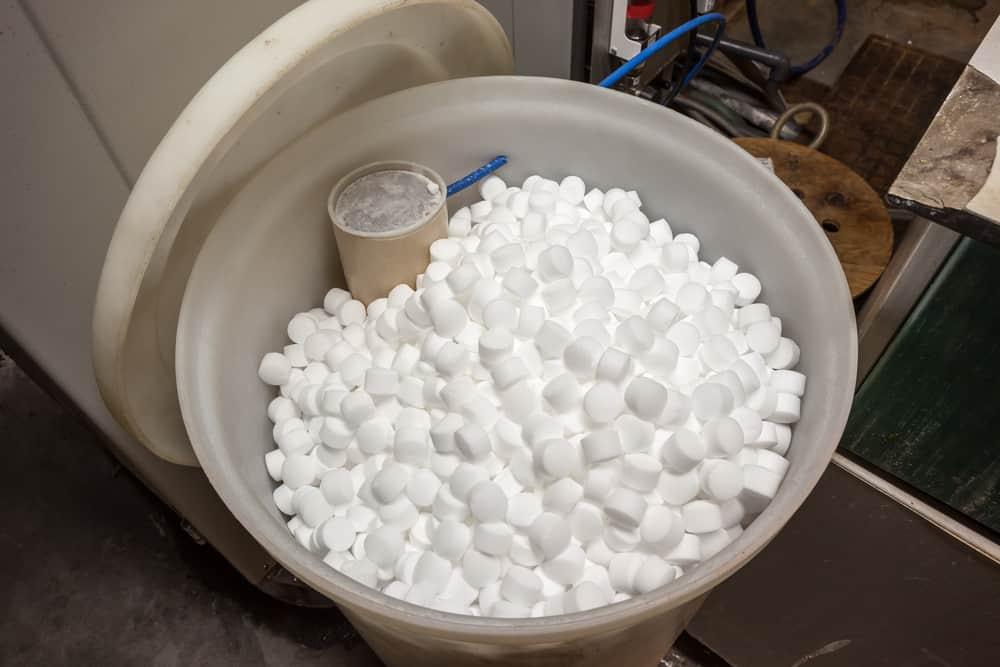Photo: amazon.com
A water softener can work miracles on well water by turning rusty water clear, removing sulfur odors, and eliminating minerals that clog pipes and damage appliances—but only when it’s filled with the right softener salt.
The quality of softener salt plays a critical role in how well a softener is able to soften water. Softener salt comes in a surprising number of forms, ranging from evaporated salt pellets, sea salt, rock salt, crystals, and even saltless softeners that use potassium chloride instead of sodium chloride.
With so many options available, it can be a challenge to choose the right product for a home’s water softener. This article takes a deep dive into the world of water softeners and lists crucial factors to consider when shopping for the best water softener salt.
Photo: amazon.com
Before You Buy Water Softener Salt
In order to buy the right water softener salt, you’ll first need to know what you’re dealing with by testing your water’s hardness. Water hardness can be measured by purchasing a soap test kit. This simple kit includes a bottle and vial of liquid soap with a dropper. To test the water, fill to the line, add drops of soap, and shake the bottle until the water produces suds. The more drops of soap it takes, the harder the water is.
What to Consider When Choosing the Best Water Softener Salt
While the type of salt largely determines how effective it is at softening water, there are other factors to consider as well, including purity and water hardness. Read on to learn more about these and other important characteristics of water softener salt.
Type
There are numerous options to consider when selecting the type of salt for a water softener, including sea salt, rock salt, crystal, pellets, and potassium chloride.
Purity
Purity refers to the percentage of material other than salt that is present in the product. The purer the salt, the less insoluble material such as rocks and earth it contains. Pure softener salt lasts longer than salt with impurities and won’t leave residue in the softener’s brine basin. Pure salt also easily dissolves in the softener, reducing the risk of bridging or clogging and making the entire system more efficient. Most softeners are at least 99.5 percent sodium chloride. The highest quality water softener salt, evaporated salt pellets, are 100 percent pure.
Water Hardness and Usage
The type and amount of salt needed for a home depends on the size of the household and the hardness of the water. Small households with two people use about two 40-pound bags of salt in their water softeners every 2 months. Families of four use about three 40-pound bags every 2 months, while large families may go through four bags every 2 months.
Homes with a high level of minerals in their water such as magnesium and calcium will require more salt. A water softener for a four-person home that typically requires three bags of salt every 2 months may need four or more bags every 2 months if the home has particularly hard water. Homes with hard water should use evaporated salt pellets to get the most out of each load of salt.
Maintenance Preferences
The type of salt can also have a significant impact on water softener maintenance. Impurities in the salt leave deposits in the water softener. As these deposits build up, the softener must be flushed to remove them. Eventually, these deposits can wear down the internal parts of the softener, shortening its life. Water softener salts with a low percentage of impurities, such as evaporated pellets, leave fewer deposits, extending the time between maintenance for the water softener.
The type of water softener salt can also impact bridging. Bridging occurs when the salt in the softener forms a rigid crust in the brine tank. This “crust” prevents the salt from dropping down into the softener. Because bridging typically takes place well below the visible top layer of salt in the tank, this problem usually goes undetected until the water quality is impacted.
Bridging requires the user to break up the salt manually to keep the salt flowing into the water softener. Salts with a greater percentage of impurities are more likely to cause bridging in the brine tank than purer salts.
Our Top Picks
The list below includes water softening salts that are capable of softening hard water without leaving harmful residues in the brine tank. Any of the products below will work in a saltwater softener.

Best Overall
1Morton Clean and Protect II Water Softening Pellets
Photo: amazon.com Check Latest PriceThis pure water softener salt from Morton consists of evaporated pellets, the purest form of salt. They dissolve easily in water, preventing bridging that can hamper performance. With no impurities such as rock or earth in the salt, this product doesn’t leave a residue that can build up in the water softener, which can shorten its life and require more frequent maintenance.
Morton Clean and Protect II is also effective at softening very hard water, preventing scaling in pipes, eliminating rust stains on faucets and in toilets, and improving the performance of dishwashers and washing machines. Morton Clean and Protect II comes in 40-pound bags. For best results, add two to four bags to the softener’s brine basin per month depending on the size of the household.
Pros
Cons
Best Natural
2Cargill Salt 7304 Water Softener Salt
Photo: amazon.com Check Latest PriceThis water softener salt from Cargill is created by dehydrating seawater with wind and sun to create a product that includes no additives, making it a great option for those looking for an all-natural product for their water softener.
As with other salts, this product softens water, helping to prevent scaling in plumbing and film from forming in sinks and bathtubs. It also helps extend the life and improve the performance of water-consuming appliances such as clothes washers and dishwashers. With its 99.6 percent purity, this salt resists bridging and mushing. It’s also safe for other applications, such as curing pickles and other foods or keeping walkways ice-free. Cargill Diamond Crystal comes in 40-pound bags.
Pros
Cons
Best Lightweight
3Morton salt 1499 clean protect
Photo: amazon.com Check Latest PriceHoisting a 40-pound bag of salt into a brine tank that’s 3 or 4 feet tall once or twice a month is no easy task. With their lighter 25-pound weight, these water softening pellets are a great option for those who struggle with heavier bags. In addition to being lightweight, each bag also includes a large built-in handle at the top that makes it easier to grip for carrying and pouring.
Morton Salt consists of evaporated pellets, which are 100 percent pure salt and leave little residue to clean up. With fewer impurities, this salt can soften very hard water, helping to eliminate staining in faucets and sinks. It will also improve the performance of water heaters by eliminating impurities that make water harder to heat, such as calcium nitrate.
Pros
Cons
Best Potassium Chloride
4Morton Potassium Chloride Pellets
Photo: amazon.com Check Latest PriceFor those living with high blood pressure or other health conditions that require a reduced salt diet, traditional water softener salts just aren’t an option. Morton’s potassium chloride pellets offer an excellent option. This product is 99 percent sodium-free, ensuring it won’t affect the daily salt intake of residents in the home, and adds blood pressure-lowering potassium to the water.
As with salt-based softeners, Morton Potassium Chloride softens hard water, helping to prevent scaling on pipes or inside appliances while making soaps and detergents used in the home sudsier and more effective. Morton potassium chloride comes in 40-pound bags with a built-in handle that makes it convenient for carrying and pouring. To use, add a bag of potassium chloride pellets to the brine basin each month.
Pros
Cons
Also Consider
5Rust Out Water Softener Cleaner
Photo: amazon.com Check Latest PriceRust Out Water Softener Cleaner is specially formulated to combat high iron content in water, eliminating the orange stains it can cause in faucets, bathtubs, toilets, and even clothing. Rust Out functions as an additive to existing water softener salt and can be mixed into the system, either by creating a solution and adding it to the brine well or by layering a half cup of it in the well between two 40-pound bags of softener salt.
Once added, Rust Out takes a few weeks to work into the water softener before it starts working. The result is clear water, as well as tubs, faucets, and sinks that no longer have to be scrubbed with rust removal cleaners. Rust Out comes in 22-ounce bottles, which is enough for five treatments.
Pros
Cons
Our Verdict
While water softening needs and systems can vary among households, the Morton Clean and Protect II Water Softening Pellets is one of the best water softener salts for most home needs. For those who try to limit sodium intake, the Morton Potassium Chloride Pellets is an excellent alternative that uses potassium chloride to soften water.
How We Chose the Best Water Softener Salt
These recommendations for the best water softener salts include a variety of options to suit the various needs of most typical users. As softening salts come in a range of types, including evaporated salt pellets, sea salt, rock salt, crystals, and even saltless softeners that use potassium chloride instead of sodium chloride, we focused our research on easy-to-carry options that are best suited for residential settings. We also evaluated the water softener salts based on the purity of formula, water hardness, and maintenance requirements.
Our favorite options range from 25 to 40 pounds, and each must be added every month or two to a household water softening system for optimal results. All of the products that made our list can work in a saltwater softener, and some are able to perform additional household tasks, making those products even more useful.
The Advantages of Using Water Softener Salts
The benefits of using water softener salt, in conjunction with a water softener, are many.
FAQs About Water Softener Salt
If you’re wondering what’s in water softening salt or how it can be used for other purposes, then read on for answers to some of the most commonly asked questions about water softener salt.
Q. Does it matter what kind of salt I use in my water softener?
The type of salt you use in your water softener does make a difference. While all salts will soften hard water, pellet salts will do so more efficiently because they are purer. Salts that include rock and earth leave residue inside a water softener, requiring the user to clean it more often.
Q. Does softening salt contain chemicals?
Most softener salt is made from hydrogen chloride, which is very similar to table salt. Salt-free water softeners are made from potassium chloride.
Q. Can I use softening salt for other purposes?
Softening salt can also be effective for other purposes. It can be used for melting ice and snow from walks, killing weeds in a garden, pickling foods, or making ice cream, although it’s a good idea to ensure the product is food safe before using it around food.
Q. How often should I add salt to water softeners?
This depends on the size of a household. A water softener serving a four-person family requires three bags of salt every 2 months, whereas a water softener for a household will go through about two bags every 2 months.









